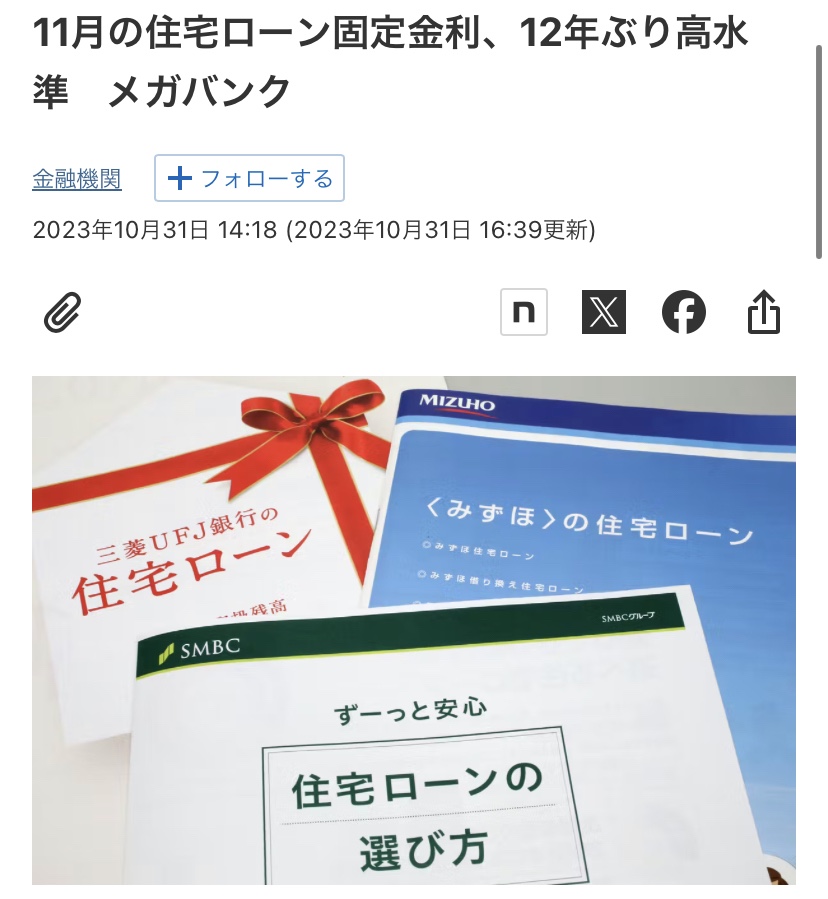( English ver. is below JPN ver.)
本日は、不動産業界に身を置くものとして、ビッグニュースが入ってきました。
そう、利上げです。
7月に続き長期金利が上がる?
昨夜、日本経済新聞に
「(日銀は)長短金利操作(イールドカーブ・コントロール、YCC)の再修正を議論する。現在1%としている長期金利の事実上の上限を柔軟にし、一定程度1%を超える金利上昇を容認する」
日銀、金利操作を再修正へ 長期金利1%超え柔軟に 日本経済新聞 2023年10月30日 23:00
と言う記事がのっておりました。
そして午後には、日銀は金利上昇を容認して
日銀は31日に開いた金融政策決定会合で長短金利操作(イールドカーブ・コントロール、YCC)の再修正を決めた。これまで長期金利の事実上の上限としていた1%を「めど」として、一定程度超えることを容認することにした。
「日銀植田総裁、長期金利「1%大幅には超えず」
金融、資本家だけでなく我々にも影響が
この記事は、銀行や証券会社や投資家など、金融機関や資産がある人だけに関係あるニュースなだけでなく、記録、皆さんの生活にも直接的に関係してくるニュースです。
ファイナンシャルプランナーでもある私が、不動産の観点からこの記事を解説したいと思います。
長期金利は住宅ローンの金利に影響
一般的に、固定金利型の住宅ローンの金利は、日銀の長期金利に影響を受けるとされています。
長期金利が上がる、と言う事は、住宅ローンの金利が上がり、利用者の金利負担(返済総額)が増える事になります。
日銀は、景気を回復する(デフレ脱却)ため、世の中のお金の流通量を増やして、消費や設備投資に資金が回りやすくするため、金利を抑える政策を取ってきました。
その一環として、長期国債等の買入れを通じて、長期金利を引き下げてきました。
2016年以降、長期金利は日銀により人為的に約0.2%程度に抑えられてきましたが、今年7月から0.5%を「めど」に上限をアップし、今後は、一定程度1%を超える金利上昇を容認する案を取る方向に進むようです。
今でもたったの1%ですが、0.2%だったことを考えると5倍に跳ね上がったと言えます。
もう明日からあげるのメガバンクは!?
夕方には、メガバンク3行が、11月から適用される固定金利型の金利を上げる発表をしました。が、これは今回の見直し(利上げ)は考慮されていない段階での決定です。

よって、12月以降の金利は今回上がった金利よりさらに上がると考えるのが妥当でしょう。
今後、住宅ローンを検討されている方は、金利動向にしっかりと目を向けていきましょう。(金融機関はその辺りをしっかりと考慮して返済してもらえるかを審査するとは思いますが、、)
最後に、、、、
先日下記のようなブログを書き、住宅ローンをなるべく多く借りよう!と書きました。
住宅ローンの金利が上がれば、それだけ返済額も多くなり、不利になりそうです。しかし、それでもなお、私は住宅ローンはなるべく多く活用すべきだと思います。
金利が上がったということは、それだけインフレも進んでいるということ。ということは、借金の価値はどんどん減っていき、またリスク資産は値上がりしていきます。
この記事を書いた時と状況は何ら変わっていないのです。
English version
Today, as someone involved in the real estate industry, we’ve received significant news – an interest rate increase. This morning, an article in the Nikkei newspaper discussed the Bank of Japan’s reconsideration of its Yield Curve Control (YCC) policy, which has been keeping long-term interest rates at around 1%. They are now considering a more flexible approach, allowing interest rates to exceed 1% to some extent.
In the afternoon, Governor Kuroda of the Bank of Japan stated that long-term interest rates would not significantly exceed 1%, as the Bank of Japan decided to revise its YCC policy in a meeting on the 31st of this month. Previously, they had treated 1% as a “target” for long-term interest rates and are now willing to allow rates to go beyond that to a certain extent.
This news not only affects financial institutions, banks, securities companies, and investors but also directly impacts everyone’s daily lives.
As a financial planner and from a real estate perspective, I would like to explain the implications of this article.
Long-term interest rates affect housing loan rates. Generally, the interest rates on fixed-rate home loans are influenced by the Bank of Japan’s long-term interest rates.
An increase in long-term interest rates means higher housing loan rates, leading to increased financial burdens for borrowers.
The Bank of Japan has pursued a policy of keeping interest rates low to boost economic recovery and increase the circulation of money in the economy, making funds more accessible for consumption and capital investment. One of their tools for this has been purchasing long-term government bonds to lower long-term interest rates.
Since 2016, long-term interest rates have been kept at around 0.2%. However, as of July this year, they are considering allowing rates to go above 0.5%, aiming for around 1% in the future. While 1% may seem low, considering it was 0.2%, it represents a fivefold increase.
In the evening, three major banks announced that they would raise interest rates on fixed-rate loans starting in November. However, it’s important to note that these decisions were made without considering this recent policy revision (interest rate hike). Therefore, it’s reasonable to expect further rate increases from December onward.
If you are considering a home loan in the future, it’s crucial to closely monitor interest rate trends. Financial institutions will likely assess your ability to repay while taking these changes into account.



